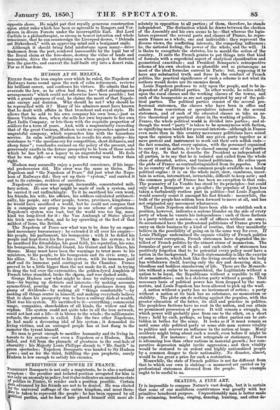HUDSON AT ST. 11 - ELFNA.
Foam from the iron empire over which he ruled, the Napoleon of Railways turns round upon the rock of calm retirement, reviews his brilliant career, and confesses his virtues. He admits that he overrode the law, as he often had done, to "effect advantageous arrangements" which could not otherwise have been possible ; but with a grand openness of soul, he claims the merit of that Napole- onic energy and decision. Why should he not P why should he be reproached with it ? Many of his admirers must have known that he dealt with affairs in that trenchant and royal style. He allows that he sold to his own company his own iron,—just as Queen Victoria does, when she sells her own bayonets to her own East India Company, or lets them with the requisite proportion of soldiers for a term of years. And, with a magnanimity exceeding that of the great Corsican, Hudson vents no reproaches against an ungrateful company, which reproaches him with the hazardous service. In calm self-justification he recalls his state policy—his resistance to "the specious cry for competition, short distances, and cheap fares" ; vouchsafes counsel on the policy of the present, and generously exults in the future prosperity to be born of those seeds -which he has left as a legacy to an ungrateful world. He feels -that he was right—or -wrong only when wrong was better than right. Hudson may assuredly enjoy a peaceful conscience, if his impe- rial predecessors did. His error was the same as theirs. The Napoleon and "the Napoleon of Peace" did just what the Napo- leon of Railways did; they set up their "system," and carried it out to its extreme reckless of sacrifices.
Napoleon's system was prompt, inexorable, concentrated mili- tary action. He saw what might be made of such a system, and he carried it out unflinchingly. To it he sacrificed his own word, his friends, his wife, his officers, his soldiers calculated arithmeti- cally, his people, any other people, towns, provinces, kingdoms— he would have sacrificed a world, but he could not compass that in a campaign nor grasp its map in one scheme of operations. Napoleon's system was vast, but the world was too big, man- kind too long-lived for it : the Van Amburgh of States played his trick once too often, and he lay sprawling at the feet of that mildest of lions, the British.
The Napoleon of Peace saw what was to be done by an organ- ized mercenary bureaucracy : he extended it all over his empire— his people, his parliament, his bourgeoisie ; with it he defied his people and kept down his free press. That as his system; to it he sacrificed his friendships, his good faith, his reputation, his sons, his bourgeoisie, his National Guard, his Guizot and his Thiersi his throne. Many must have been the warnings to trust more to his ministers, to his people to his bourgeoisie and its civic array, to his allies. No; he trusted to his system, with its immense paid staff and its immense paid contingent in the Chamber. France proved to be a little bigger than the net made for it, and in trying -to drag the toil over the extremities, the golden-lyred Amphion of French betas stumbled, broke the Aarm, and was dashed aside.
George Hudson so* what might be done by railway consolida- tion—by buying up districts and interests—by making accounts symmetrical, pouring the water of forced purchases down the pump of dividends—by. making all "things comfortable "—by making all things centre in himself, and making everybody believe that to share his prosperity was to have a railway dash at wealth. That was his system. He sacrificed to it—everything; commercial usage, companies, shareholders of all kinds, the widow and the orphan. The system could not quite take in all the iron network, could not last out a life—it is blown to the winds : the millionnaire refunds, the potentate is exiled. Like the two other Napoleons, he had made a devouring idol of his system ; it demanded its living victims, and an outraged people has at last flung to the monster the tyrant himself.
No man is great enough to sacrifice humanity and its living in- terests to his system—not even a Napoleon or a Hudson. Each failed, and fell from the pinnacle of greatness to the coal-hole of obscurity : his Majesty Louis Philippe shrank to "Mr. Smith" in green spectacles ; Napoleon Bonaparte was handed to Sir Hudson Lowe ; and as for the third, fulfilling the pun prophetic, surely Hudson is low enough to satisfy his enemies.


























 Previous page
Previous page